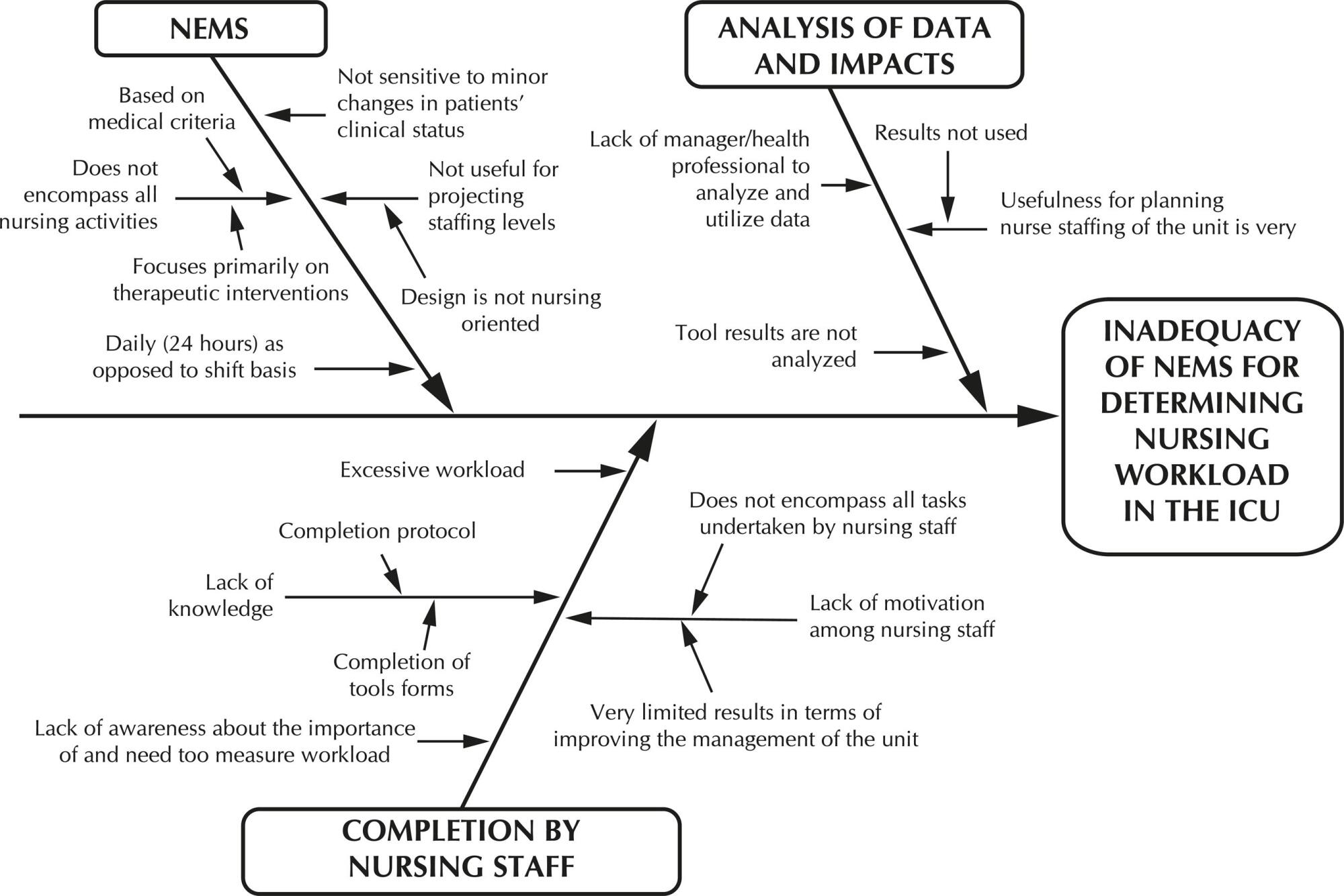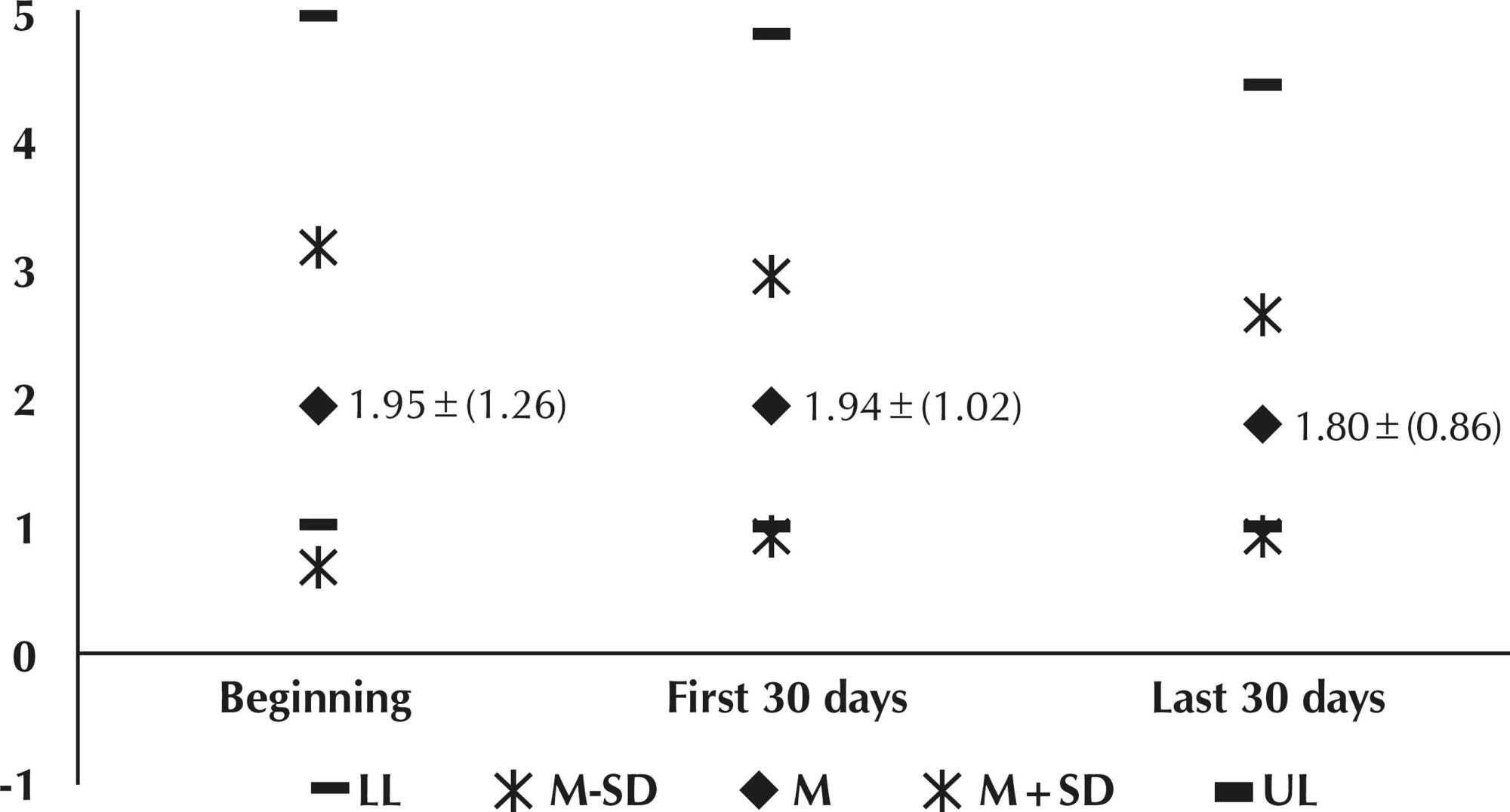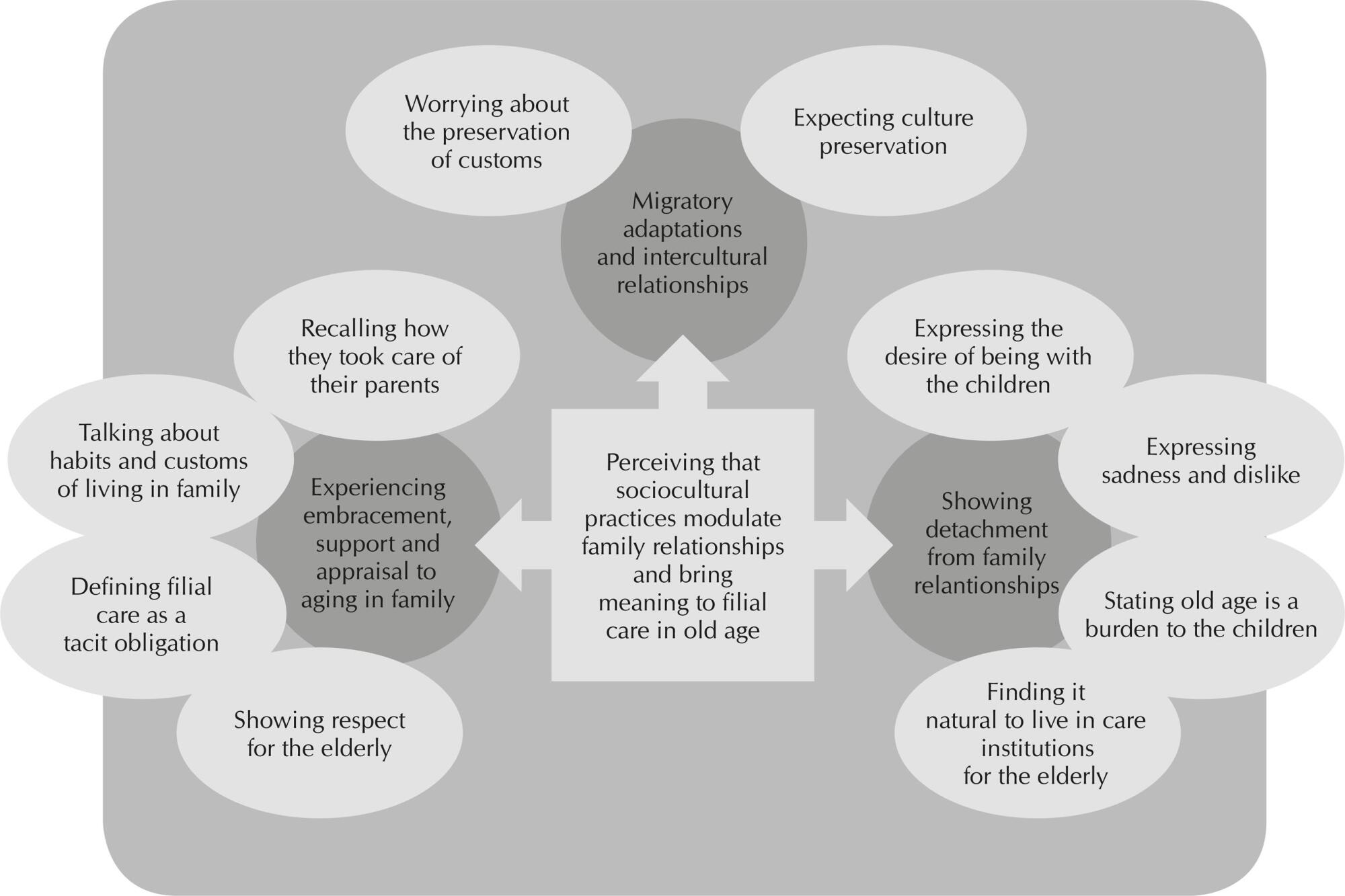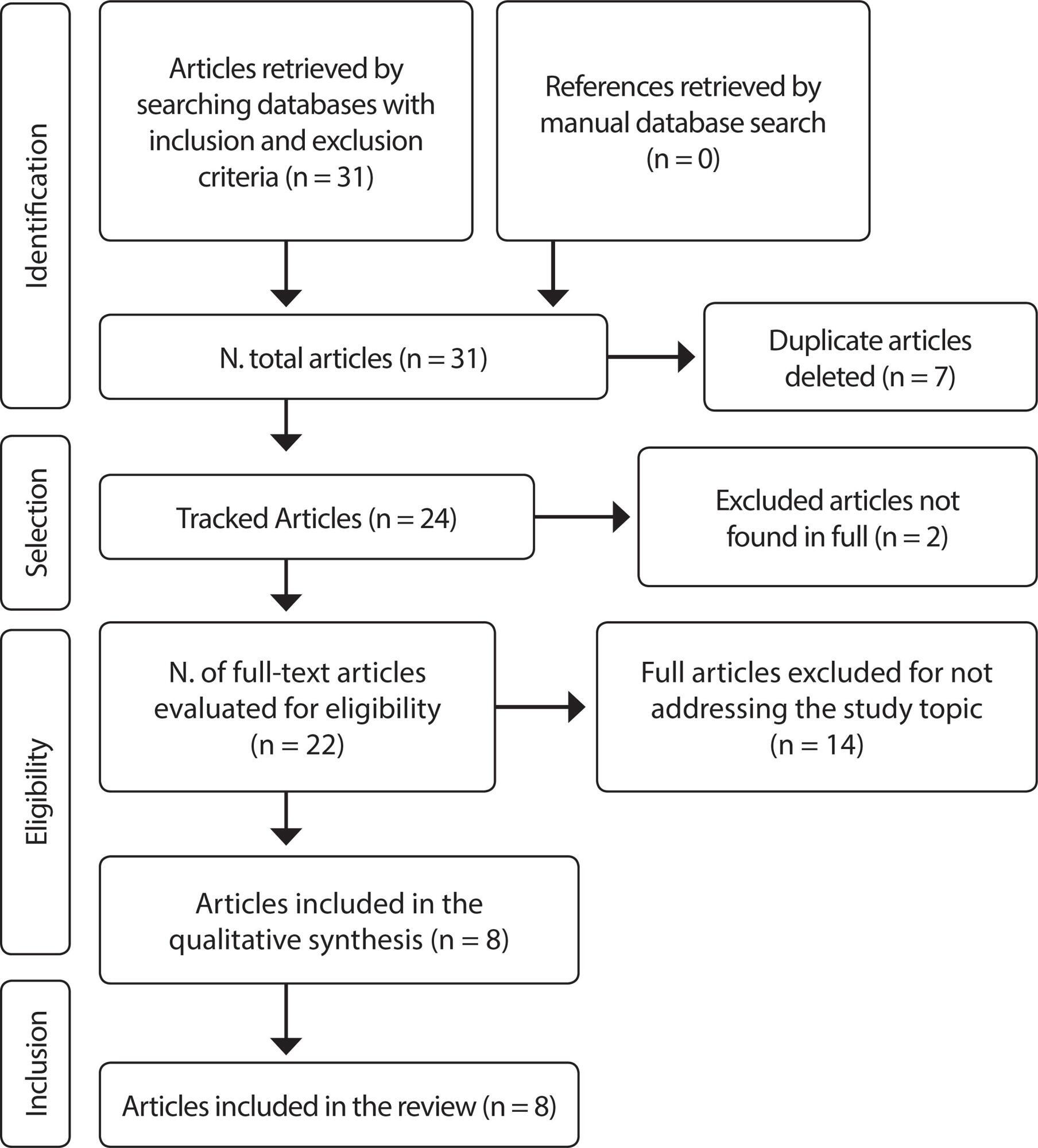-
01-01-2017
Adecuación de escalas para medir cargas de trabajo mediante metodología de calidad
Revista Brasileira de Enfermagem. 2017;70(1):39-46
Abstract
Adecuación de escalas para medir cargas de trabajo mediante metodología de calidad
Revista Brasileira de Enfermagem. 2017;70(1):39-46
DOI 10.1590/0034-7167-2016-0246
Views0RESUMEN
Objetivo:
Determinar cuál de las escalas evaluadas (NEMS y NAS), es más adecuada para Unidades de Cuidados Intensivos aplicando metodología de calidad.
Método:
Tras identificar como oportunidad de mejora la no adecuación de la escala NEMS para determinar cargas de trabajo de enfermería en UCI, se aplica metodología de los ciclos de mejora a dicha escala y a la NAS, como propuesta de mejora, evaluando los criterios: medición de cargas de trabajo al día y por turno, inclusión de todas las actividades enfermeras, y análisis por paciente y unidad.
Resultados:
Escala NEMS no muestra diferencias significativas en el cumplimiento (67%). Comparación NEMS-NAS, todos los criterios excepto el 1º, obtienen mejora significativa. NEMS sólo valora el criterio 1 (64,22%), y NAS todos con un cumplimiento para el 1º, 2º y 4º del 64,74%, y el 3º del 100%.
Conclusión:
La escala NAS es más adecuada para medir cargas de trabajo de enfermería en UCI.
Keywords:Carga de TrabajoControl de CalidadEnfermeríaGestión de la CalidadUnidades de Cuidados IntensivosSee more
-
01-01-2017
Assessing the adequacy of workload measurement tools using a quality-based methodology
Revista Brasileira de Enfermagem. 2017;70(1):39-46
Abstract
Assessing the adequacy of workload measurement tools using a quality-based methodology
Revista Brasileira de Enfermagem. 2017;70(1):39-46
DOI 10.1590/0034-7167-2016-0246
Views0See moreABSTRACT
Objective:
determine which tool (NEMS and NAS) is most suitable for use in intensive care units using a quality-based methodology.
Method:
after identifying the opportunity for improvement “Inadequacy of the NEMS for determining nursing workload in the intensive care unit (ICU)”, we assessed the NEMS and the NAS, as a proposed improvement to the NEMS, using quality improvement cycles methodology based on the following criteria: measurement of daily nursing workload on a daily and shift basis; the tool encompasses all nursing activities undertaken in the ICU; and workload assessed per patient and unit.
Results:
there was no significant difference in level of compliance for the NEMS (67%). The comparison NEMS-NAS showed that there was a statistically significant improvement for all criteria except criterion 1. The NEMS only assesses criterion 1 (64.22%); while the NAS assessed all four criteria, obtaining a compliance rate of 64.74% for criteria 1, 2, and 4, and 100% for criterion 3.
Conclusion:
the NAS is more suitable for measuring nursing workload in UCIs.

-
01-01-2017
Educational nursing intervention to reduce the hyperphosphatemia in patients on hemodialysis
Revista Brasileira de Enfermagem. 2017;70(1):31-38
Abstract
Educational nursing intervention to reduce the hyperphosphatemia in patients on hemodialysis
Revista Brasileira de Enfermagem. 2017;70(1):31-38
DOI 10.1590/0034-7167-2016-0015
Views0See moreABSTRACT
Objective:
to evaluate the effectiveness of an educational nursing intervention to reduce hyperphosphataemia in chronic renal patients on hemodialysis.
Method:
quasi-experimental study with 63 hyperphosphatemic patients on hemodialysis. The intervention consisted of developing and providing a printed and illustrated manual to patients containing information on disease control. The participant was asked to complete a daily checklist with the aim to reinforce aspects provided in the manual. Laboratory tests and itching intensity were analyzed at the beginning of the study, and at 30 and 60 days after the educational intervention.
Results:
the mean age of participants was 58±13.1 years, with a treatment time of 51.1±44.7 months. A reduction in serum phosphorus values of 7.06 ± 1.43 to 5.80 ± 1.53 (p <0.001) and the intensity of itching after the intervention was observed.
Conclusion:
the educational nursing intervention was effective in reducing phosphate and decreasing itching in hyperphosphatemic patients.

-
01-01-2017
Filial care and the relationship with the elderly in families of different nationalities
Revista Brasileira de Enfermagem. 2017;70(1):22-30
Abstract
Filial care and the relationship with the elderly in families of different nationalities
Revista Brasileira de Enfermagem. 2017;70(1):22-30
DOI 10.1590/0034-7167-2015-0050
Views0See moreABSTRACT
Objective:
identify how filial care and the relationship with the elderly occur in families of different nationalities.
Method:
qualitative study carried out in a town on the triple frontier of Paraná, comprising 33 elderly people of five different nationalities, adopting the Symbolic Interactionism and the Grounded Theory as theoretical-methodological strategy.
Results:
among Lebanese people, the Muslim religion teaches children to obey and respect parents; among French, distant family relationships and institutions for the elderly stand out. Paraguayans hold close family relationships; Chinese people consider filial care as a tacit obligation; Brazilians, in turn, tend to embrace and take care of their parents in old age.
Conclusion:
family care prevailed, but the traditions of each society lead the actions of that care, demanding health professionals’ capacity of recognizing in which context the elderly is inserted.

-
01-01-2017
Excess fluid volume: sociodemographic and clinical analysis in haemodialysis patients
Revista Brasileira de Enfermagem. 2017;70(1):15-21
Abstract
Excess fluid volume: sociodemographic and clinical analysis in haemodialysis patients
Revista Brasileira de Enfermagem. 2017;70(1):15-21
DOI 10.1590/0034-7167-2015-0138
Views0See moreABSTRACT
Objective:
To analyse the defining characteristics and related factors in the nursing diagnosis Excess fluid volume and its relationship to sociodemographic and clinical variables in haemodialysis patients.
Method:
Cross-sectional study, conducted using a form and physical examination, with a sample of 100 patients, between December 2012 and April 2013 at a university hospital and a dialysis clinic.
Results:
It was found 10 significant statistical associations between the defining characteristics/ related factors of Excess fluid volume and the sociodemographic and clinical variables.
Conclusion:
The defining characteristics and related factors of Excess fluid volume could be influenced by sociodemographic and clinical variables in haemodialysis clientele.
-
01-01-2017
Excesso de volume de líquidos: análise clínica e sociodemográfica em pacientes de hemodiálise
Revista Brasileira de Enfermagem. 2017;70(1):15-21
Abstract
Excesso de volume de líquidos: análise clínica e sociodemográfica em pacientes de hemodiálise
Revista Brasileira de Enfermagem. 2017;70(1):15-21
DOI 10.1590/0034-7167-2015-0138
Views0See moreRESUMEN
Objetivo:
analizar las características definitorias y los factores relacionados con el diagnóstico enfermero de exceso de volumen líquido y su relación con variables sociodemográficas y clínicas en pacientes de hemodiálisis.
Método:
estudio transversal, realizado mediante un formulario y examen físico, con una muestra de 100 pacientes, entre diciembre de 2012 y abril de 2013 en un hospital universitario y una clínica de diálisis.
Resultados:
se encontraron 10 asociaciones estadísticamente significativas entre las características definitorias, factores relacionados de volumen de exceso de líquido y las variables sociodemográficas y clínicas.
Conclusión:
las características definitorias y los factores relacionados de exceso de volumen líquido podrían estar influenciados por variables sociodemográficas y clínicas en clientes de hemodiálisis.
-
01-01-2017
Enfrentando desafios em tempos de adversidades
Revista Brasileira de Enfermagem. 2017;70(1):1-2
Abstract
Enfrentando desafios em tempos de adversidades
Revista Brasileira de Enfermagem. 2017;70(1):1-2
DOI 10.1590/0034-7167.2017700101
Views0Na confluência da tradição, do respeito pela história e da abordagem crítica das questões inerentes ao desenvolvimento da profissão de enfermagem, a Associação Brasileira de Enfermagem (ABEn) vem consolidando uma trajetória exemplar na sociedade brasileira. Ao longo da sua história, as reflexões, discussões e decisões sobre assuntos pertinentes e prementes da profissão têm possibilitado intervenções […]See more -
01-01-2017
Facing challenges in times of adversity
Revista Brasileira de Enfermagem. 2017;70(1):1-2
Abstract
Facing challenges in times of adversity
Revista Brasileira de Enfermagem. 2017;70(1):1-2
DOI 10.1590/0034-7167.2017700101
Views0At the confluence of tradition, respect for history and a critical approach to the issues inherent to the development of the nursing profession, the Brazilian Nursing Association (ABEn) has been consolidating an exemplary trajectory in Brazilian society. Throughout its history, the reflections, discussions and decisions on pertinent and urgent subjects of the profession have made […]See more
-
EXPERIENCE REPORT02-10-2020
Overcoming the challenges to offer quality training in psychiatric nursing
Revista Brasileira de Enfermagem. 2020;73(1):e20180208
Abstract
EXPERIENCE REPORTOvercoming the challenges to offer quality training in psychiatric nursing
Revista Brasileira de Enfermagem. 2020;73(1):e20180208
DOI 10.1590/0034-7167-2018-0208
Views0See moreABSTRACT
Objective:
to report the experience of the Psychiatric Nursing professors of the Nursing Undergraduate Course of the Nursing School, Universidade Federal de Minas Gerais (UFMG) and the challenges faced to offer quality training.
Method:
This is an experience report about the experience of Psychiatric Nursing professors of the Nursing Undergraduate Course of the Nursing School, UFMG.
Results:
After losing the workload of 120 hours in the Psychiatric Nursing Undergraduate Course, the area developed elective disciplines with a total of 330-hour load, in addition to extension and research projects.
Final considerations:
the precariousness of the area of Nursing training after curricular restructuring in a higher education institution, whether in relation to hour load or in the allocation of teaching vacancies, is in line with advances of the Brazilian Psychiatric Reform and epidemiological data of psychic illness and drug use.
-
REVIEW07-31-2020
Educational practices for families of children and adolescents using a permanent venous catheter
Revista Brasileira de Enfermagem. 2020;73:e20190129
Abstract
REVIEWEducational practices for families of children and adolescents using a permanent venous catheter
Revista Brasileira de Enfermagem. 2020;73:e20190129
DOI 10.1590/0034-7167-2019-0129
Views0See moreABSTRACT
Objectives:
to identify, in the scientific literature, the educational practices performed by nurses with the families of children and adolescents using long-term venous catheters, concerning home care.
Methods:
integrative review in LILACS, PubMed, SCOPUS, Web of Science and CINAHL databases, from August to September 2018.
Results:
we analyzed eight articles that met the inclusion criteria. The results showed that all studies are international, mostly North American and with low level of evidence. The educational practices found were home visits, production of printed educational materials, use of mannequins for simulation, creation of an educational video, and combined educational practices.
Final Considerations:
the care provided by families at home in the countries studied is more complex than in Brazil, and the conclusion is that Brazilian studies need to advance in publications related to this area.

-
ORIGINAL ARTICLE02-06-2023
Teaching entrepreneurship in undergraduate Nursing course: evaluation of an educational proposal
Revista Brasileira de Enfermagem. 2023;76(2):e20210244
Abstract
ORIGINAL ARTICLETeaching entrepreneurship in undergraduate Nursing course: evaluation of an educational proposal
Revista Brasileira de Enfermagem. 2023;76(2):e20210244
DOI 10.1590/0034-7167-2021-0244
Views1See moreABSTRACT
Objective:
To evaluate a proposal for teaching entrepreneurship in an undergraduate Nursing course that uses active methodologies and activities based on the theory of meaningful learning.
Methods:
Interventional, prospective study, with a quantitative perspective, with a total of 102 participating students, carried out from July 2017 to December 2019 at a public university in the state of Sao Paulo. Statistical analysis were performed by non-parametric Chi-square or Fisher’s exact tests, with differences considered statistically significant if p < 0.05.
Results:
Improvements were observed in almost all items evaluated, revealing that meaningful learning became more effective with the use of active teaching methodologies. Most students need adaptation and effort to be put into these methods.
Conclusions:
The proposal offers pedagogical content adaptation, specifically for nursing students. New research should expand teaching-learning techniques for the development of future nurses, preparing them adequately for the job market.

-
ORIGINAL ARTICLE08-16-2021
Gender debate as a challenge in nursing training
Revista Brasileira de Enfermagem. 2021;74(5):e20201001
Abstract
ORIGINAL ARTICLEGender debate as a challenge in nursing training
Revista Brasileira de Enfermagem. 2021;74(5):e20201001
DOI 10.1590/0034-7167-2020-1001
Views0See moreABSTRACT
Objectives:
to understand the challenges of introducing gender debate in nursing training from undergraduate students’ perspective.
Methods:
a qualitative, exploratory-explanatory study. Data were collected through a semi-structured interview applied to 12 undergraduate nursing students at a public university in São Paulo. For data treatment and analysis, the Discourse of the Collective Subject was used in light of Boaventura de Sousa Santos’ knowledge production paradigm theoretical framework.
Results:
nursing education remains centered on the traditional scientific model, neglecting gender and strengthening stereotypes aimed at the feminization of the profession.
Final Considerations:
nursing training has a challenge of implementing actions that deepen the gender theme. Therefore, some strategies are suggested, such as improving professor training and appropriating emancipatory pedagogical practices; reviewing pedagogical political projects; curriculum theorization and restructuring; problematizing gender issues for nursing leadership.
-
ORIGINAL ARTICLE08-30-2021
Historical aspects in pain management in palliative care in an oncological reference unit
Revista Brasileira de Enfermagem. 2021;74(5):e20200761
Abstract
ORIGINAL ARTICLEHistorical aspects in pain management in palliative care in an oncological reference unit
Revista Brasileira de Enfermagem. 2021;74(5):e20200761
DOI 10.1590/0034-7167-2020-0761
Views0See moreABSTRACT
Objective:
Describe the actions implemented for pain management in palliative care oncology and analyze the contribution of Hospital do Câncer IV, as a reference unit at the National Cancer Institute.
Methods:
Study of the history of the present time, whose sources were written documents and interviews with five participants. The collection took place from February to June 2018. The analysis of the written sources took place through internal and external criticism of the documents, considering their chronology and theme.
Results:
Professionals contributed with actions for pain management in palliative oncology care: in discussions and final drafting of ordinances, as rapporteurs at national and international events, in the elaboration of humanization conducts and systematization of assistance in addressing pain.
Final considerations:
These actions favored assistance in palliative oncology care at various levels of health care for patients and families, with greater technical and scientific recognition for all.
-
TECHNOLOGICAL INNOVATION06-04-2021
Development of a nursing website for critical care regarding healthcare-associated infections
Revista Brasileira de Enfermagem. 2021;74:e20200928
Abstract
TECHNOLOGICAL INNOVATIONDevelopment of a nursing website for critical care regarding healthcare-associated infections
Revista Brasileira de Enfermagem. 2021;74:e20200928
DOI 10.1590/0034-7167-2020-0928
Views0See moreABSTRACT
Objective:
to describe the development of a website about the main healthcare-associated infections and the respective bundles to prevent these diseases, oriented toward intensive care unit nursing.
Methods:
experience report describing the development of technological innovation by nurses, using computational tools and technological production methodological research and following the product development process.
Results:
nurses developed an educational website which can be accessed through computers, tablets, and smartphones at the electronic address irastis.com and focuses on healthcare-associated infections.
Final considerations:
digital technologies have contributed to fulfill demands in health care, research, and education. The developed website has the potential to support reduction in healthcare-associated infection rates, since it makes preventive measures for these infections available and refers users to publication environments that systematize the implementation of the bundles.

-
ORIGINAL ARTICLE10-21-2019
Being an institutionalized elderly person: meaning of experiences based on Heidegger’s phenomenology
Revista Brasileira de Enfermagem. 2019;72(6):1632-1638
Abstract
ORIGINAL ARTICLEBeing an institutionalized elderly person: meaning of experiences based on Heidegger’s phenomenology
Revista Brasileira de Enfermagem. 2019;72(6):1632-1638
DOI 10.1590/0034-7167-2018-0763
Views0See moreABSTRACT
Objective:
Analyze the meaning of being an elderly person living in a long-term institution.
Method:
Qualitative study based on Martin Heidegger’s thought. Twelve phenomenological interviews were conducted with people aged over 60 years living in a long-term institution for the elderly in the city of Itabuna, Bahia, Brazil.
Results:
The units of meaning identified were: experience of progressive loss of autonomy and independence, perception of living in an institution as an inevitable circumstance; and being-with becoming being-alone/being-lonely. After the identification of ontic aspects and hermeneutical understanding, the unit of meaning was constructed: meaning of being an elderly person living in a long-term institution.
Final considerations:
The ontological needs referring to being an elderly person remain forgotten. As we are ontic and ontological, limited care to the ontic instance indicates deficiencies in institutionalization. Improvements are required to ensure the right to age with quality of life to this population.
-
06-11-2021
Resilience in elderly people: factors associated with sociodemographic and health conditions
Revista Brasileira de Enfermagem. 2021;74:e20200171
Abstract
Resilience in elderly people: factors associated with sociodemographic and health conditions
Revista Brasileira de Enfermagem. 2021;74:e20200171
DOI 10.1590/0034-7167-2020-0171
Views0See moreABSTRACT
Objective:
to describe the sociodemographic and health characteristics of elderly people, measure the score of total resilience and by sex and verify the association of sociodemographic and health variables with total resilience and by sex.
Methods:
this is a household survey with 808 elderly people, assessed by validated instruments. Student’s t test and multiple linear regression (p<0.05).
Results:
most were female, 60|-|79 years old. The total resilience score was 78.06, for men 81.53 and for women, 76.32. Total resilience was associated with males; positive self-perceived health; greater participation in Advanced Activities of Daily Living; fewer morbidities; absence of depressive symptoms. Among men and women, resilience was associated with greater participation in Advanced Activities of Daily Living and absence of depressive symptoms and, specifically, among women, positive self-perceived health.
Conclusion:
these results contribute to nursing care, aiming to encourage resilience.
Search
Search in:
Nuvem de Tags
Adolescente (85) Atenção Primária à Saúde (239) COVID-19 (91) Criança (91) Cuidados de Enfermagem (269) Educação em Enfermagem (151) Educação em Saúde (139) Enfermagem (930) Enfermagem Pediátrica (86) Estudantes de Enfermagem (77) Estudos de Validação (131) Família (87) Idoso (208) Promoção da Saúde (99) Qualidade de Vida (104) Saúde do Trabalhador (86) Saúde Mental (145) Saúde Pública (82) Segurança do Paciente (150) Tecnologia Educacional (100)



